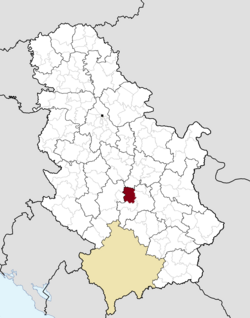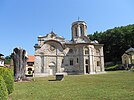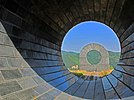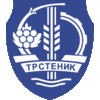Trstenik (Serbian Cyrillic: Трстеник, pronounced [tr̩stěniːk]) is a town and municipality located in the Rasina District of central Serbia. As of 2022 census, the town has 13,476, while the municipality has 35,875 inhabitants. It lies on the West Morava river.
Trstenik
Трстеник (Serbian) | |
|---|---|
Town and municipality | |
|
From top: Panorama of Trstenik, The municipality building, Church of the Holy Trinity, Trstenik theater and Cultural center, Popina Memorial Park | |
 Location of the municipality of Trstenik within Serbia | |
| Coordinates: 43°37′N 20°59′E / 43.617°N 20.983°E | |
| Country | |
| District | Rasina |
| Settlements | 51 |
| Government | |
| • Mayor | Milena Turk (SNS) |
| Area | |
| • Town | 10.08 km2 (3.89 sq mi) |
| • Municipality | 448 km2 (173 sq mi) |
| Elevation | 172 m (564 ft) |
| Population (2022 census)[2] | |
| • Town | 13,476 |
| • Town density | 1,300/km2 (3,500/sq mi) |
| • Municipality | 35,875 |
| • Municipality density | 80/km2 (210/sq mi) |
| Time zone | UTC+1 (CET) |
| • Summer (DST) | UTC+2 (CEST) |
| Postal code | 37240 |
| Area code | +381(0)37 |
| Car plates | TS |
| Website | www |
History
editIn the Early and Middle Iron Age, the tribe of Triballi inhabited the West Morava. Romans conquered the area in the 1st century AD. Roman sites include the Stražbe castrum on the right bank of the river, as well as sites in Bučje and Donji Dubić, and others still unexplored. The Romans introduced the Vitis vinifera (Common Grape Vine) to the region, which still today is processed in Serbian wineyards (It is one of the main incomes in the municipality).
In the Middle Ages, Trstenik belonged to the West Morava oblast (province). The first written record of Trstenik is from Prince Lazar's Ravanica charter dated 1381, in which he donated Trstenik to the Ravanica monastery. Ljubostinja monastery, founded by Princess Milica, was built from 1388 to 1405.[3]
In 1427, the Ottoman Empire conquered the areas of Kruševac and Trstenik. In the Western Morava valley, the Ottomans built the Grabovac fortress. After the final fall of the Serbian Despotate in 1459, Trstenik became an important Ottoman caravan stop. In an Austrian report dated 1784, Trstenik had 47 Muslim and 17 Christian houses, stone mosques, two inns and a few craft shops. At that time Trstenik was located 2km west of the present town, near the village of Osaonica.
After receiving autonomy of the Principality of Serbia, Miloš Obrenović ordered the construction of a new settlement on the right bank of the Western Morava in the period 1832-1838. In the 1870s, Trstenik got a primary school, a post office, a pharmacy, a bank and the first steam mill. In 1899, west across the river, a steel bridge was built, and the following year the Church of the Holy Trinity was built. Stalać-Kraljevo railroad opened in 1910.
From 1929 to 1941, Trstenik was part of the Morava Banovina of the Kingdom of Yugoslavia.
After World War II new facilities were built and a large part of the old quarters dates from this period. After World War II, Trstenik went through a significant industrial development with the establishment of the factory of hydraulic and pneumatic systems Prva petoletka.[4] During the period of sanctions in the 1990s, the city stagnated.
Demographics
edit| Year | Pop. | ±% p.a. |
|---|---|---|
| 1948 | 43,406 | — |
| 1953 | 46,606 | +1.43% |
| 1961 | 49,107 | +0.66% |
| 1971 | 50,624 | +0.30% |
| 1981 | 53,570 | +0.57% |
| 1991 | 54,873 | +0.24% |
| 2002 | 49,043 | −1.02% |
| 2011 | 42,966 | −1.46% |
| 2022 | 35,875 | −1.63% |
| Source: [5] | ||
According to the 2011 census results, the municipality of Trstenik had a population of 42,966 inhabitants.
Ethnic groups
editThe ethnic composition of the municipality:[6]
| Ethnic group | Population | % |
|---|---|---|
| Serbs | 41,829 | 97.35% |
| Romani | 342 | 0.80% |
| Montenegrins | 84 | 0.20% |
| Macedonians | 48 | 0.11% |
| Croats | 35 | 0.08% |
| Gorani | 29 | 0.07% |
| Yugoslavs | 17 | 0.04% |
| Bulgarians | 15 | 0.03% |
| Muslims | 15 | 0.03% |
| Romanians | 13 | 0.03% |
| Others | 539 | 1.25% |
| Total | 42,966 |
Economy
editAs of 2017, key industrial companies in Trstenik are mechanical manufacturer PPT-Petoletka and defense company PPT-Namenska, both being the successors of once-great manufacturing company "Prva Petoletka" which employed nearly 20,000 employees at its peak during the 1980s.[citation needed]
The following table gives a preview of total number of registered people employed in legal entities per their core activity (as of 2018):[7]
| Activity | Total |
|---|---|
| Agriculture, forestry and fishing | 192 |
| Mining and quarrying | 2 |
| Manufacturing | 3,314 |
| Electricity, gas, steam and air conditioning supply | 101 |
| Water supply; sewerage, waste management and remediation activities | 183 |
| Construction | 134 |
| Wholesale and retail trade, repair of motor vehicles and motorcycles | 1,251 |
| Transportation and storage | 282 |
| Accommodation and food services | 293 |
| Information and communication | 85 |
| Financial and insurance activities | 61 |
| Real estate activities | 1 |
| Professional, scientific and technical activities | 208 |
| Administrative and support service activities | 57 |
| Public administration and defense; compulsory social security | 274 |
| Education | 686 |
| Human health and social work activities | 365 |
| Arts, entertainment and recreation | 90 |
| Other service activities | 227 |
| Individual agricultural workers | 1,315 |
| Total | 9,121 |
Visitor attractions
edit- Ljubostinja - is a Serbian Orthodox monastery near Trstenik, Serbia. Located in the small mountain valley of the Ljubostinja river. It is dedicated to the Holy Virgin. The monastery was built from 1388 to 1405. Burials in the monastery include Princess Milica, Lazar Hrebeljanović's wife and Nun Jefimija, which after the Battle of Kosovo here became a nun along with a number of other widows of Serbian noblemen who lost their life's in the battles on the river Maritsa and Kosovo Polje. Today Ljubostinja is female monastery which preserves and maintains about fifty nuns. During the rebellion of Kočine, the people were invited on rebellion from the Ljubostinje monastery. After the collapse of rebellion Turks burned the monastery to revenge the Serbs, and most of the frescoes were destroyed. Also, when the monastery was set on fire a secret treasure was discovered that was hidden in the monastery wall behind icons in which the Princess Milica hid their treasure. Among the stolen treasure was located Crown of Prince Lazar, which is now located in Istanbul. Ljubostinja was declared Monument of Culture of Exceptional Importance in 1979, and it is protected by Republic of Serbia.[3]
- Veluće Monastery was built in the late 14th century, before the Battle of Kosovo. It was restored in 1973 and is protected as a Cultural Monument of Great Importance.[8]
Notable people
edit- Vladimir Jugović, former footballer, European cup champion
- Marko Baša (born 1982), Montenegrin footballer
- Nebojša Bradić (born 1956), politician, minister of culture
- Dobrica Ćosić (born 1921), writer and political theorist, president of the FR Yugoslavia
- Jovana Vojinović (1992), chess player
- Verica Kalanović, politician and three-time minister
- Dragiša Binić, footballer (Living in the municipality Trstenik)
- Vladislav F. Ribnikar, Serbian journalist, founder of daily newspaper Politika
- Miroslav Aleksić, politician, former mayor of Trstenik and a member of the National Assembly
Photo gallery
edit-
Trstenik
-
West Morava in Trstenik
-
Historical archive in Trstenik
-
House of Culture
-
Inside of the Theater in Trstenik
-
City gallery in Trstenik
-
The Church of the Holy Trinity in Trstenik
-
A monument to Partisan fighters in Trstenik
See also
editReferences
edit- ^ "Municipalities of Serbia, 2006". Statistical Office of Serbia. Retrieved 2010-11-28.
- ^ "Census 2022: Total population, by municipalities and cities". popis2022.stat.gov.rs.
- ^ a b "Споменици културе у Србији". spomenicikulture.mi.sanu.ac.rs. Retrieved 2024-09-25.
- ^ Đaković, Petrica (2024-02-04). "Priče o gigantima: Prva Petoletka, od Boinga do stečaja". Forbes Srbija (in Serbian). Retrieved 2024-09-25.
- ^ "2011 Census of Population, Households and Dwellings in the Republic of Serbia" (PDF). stat.gov.rs. Statistical Office of the Republic of Serbia. Retrieved 11 January 2017.
- ^ "ETHNICITY Data by municipalities and cities" (PDF). stat.gov.rs. Statistical Office of the Republic of Serbia. Retrieved 20 February 2018.
- ^ "MUNICIPALITIES AND REGIONS OF THE REPUBLIC OF SERBIA, 2019" (PDF). stat.gov.rs. Statistical Office of the Republic of Serbia. 25 December 2019. Retrieved 28 December 2019.
- ^ "Споменици културе у Србији". spomenicikulture.mi.sanu.ac.rs. Retrieved 2024-09-25.
External links
editMedia related to Trstenik at Wikimedia Commons






